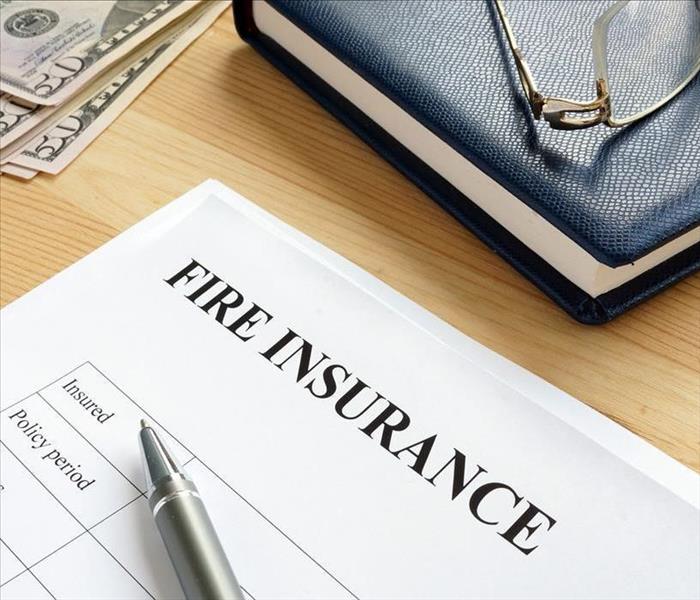What is Fire Insurance and What Does it Cover?
3/4/2021 (Permalink)
Finding the Right Fire Insurance Coverage
If you live in an area where there are constant fires cooked up by mother nature, you may need extra fire insurance protection for your home. It is a good idea to check your homeowner's policy to determine whether you have adequate coverage.
In this guide, you will discover what fire insurance is and what it covers. Some of the exclusions will also be presented. Finally, you'll be able to take the information presented here to make an informed decision bout your individual insurance needs.
What is Fire Insurance?
A typical homeowner's policy has fire coverage built into it. Most mortgage lenders won't give you a loan unless you have insurance that includes fire protection. You can also purchase additional coverage if you feel that your current homeowner's policy may be inadequate.
What does it cover?
Fire insurance covers the homeowner against total loss or damage from a wide range of sources. These sources include:
- Lightning strikes
- Faulty electrical wiring
- Natural disasters
- Appliance malfunctions
- Careless smokers
- Gas explosions
- Other accidents
Arson is normally covered. However, if someone who regularly lives in the home, like a family member, intentionally sets the house on fire, it is not covered.
These are the types of properties covered by fire insurance
Dwelling coverage.
If your home is considered a total loss due to fire, your homeowner's policy will kick in and provide the funds to rebuild your home. It will also cover any costs to remove debris from your property and haul off the remains of your charred house. It is calculated based on either the actual cash value of the house or the replacement cost. It is also based on your coverage limits.
This presents two problems:
1. Your coverage limits may not be enough to cover the costs to rebuild your house in today's market.
2. Your homeowner's policy is often based on actual cash value and not replacement cost. The difference is, the replacement cost model will provide funds to rebuild your home in today's market. On the other hand, actual cash value policies only cover your home's depreciated value.
So, let's say you bought your home ten years ago and it recently suffered a total loss due to fire damage. With an actual cash value policy, you would only get enough to cover what the house was valued at ten years ago, not what it would cost today to replace it. By having an additional fire insurance policy, you can increase coverage limits to include what the house would cost to build in today's market.
Other types of property covered
Other structures on the property. Any structure that is not attached to the home is usually covered by fire insurance. Here are a few examples of the types of structures covered:
- Toolshed
- Barn
- Detached garage
- Fences
Personal property.
These items consist mostly of your belongings that were inside the house during the time of the fire. Here are just a few examples:
- Clothing
- Furniture
- Electronic devices like TVs and computers
Your insurance company may set some limitations on covering the personal property. For example, if you own luxury items such as fine clothing, jewelry, or antique furniture, there may be additional limits to those particular items. It is a good idea to check your policy carefully to see what's excluded or limited.
Other "loss of use" coverage.
If you have no place to live while your home is being repaired or rebuilt due to fire damage, you are covered for the costs of staying in a hotel or other living accommodations.
The costs of feeding yourself and your family are also taken care of, up to certain limits. Even the costs associated with pet care and boarding may also be covered. It's best to check with your insurance advisor concerning all those important details.
What Is Not Covered?
Cars and other vehicles.
Usually, comprehensive auto insurance will be enough to cover fire damage or loss to your vehicle.
The home was vacant for more than 30 days during the time of the fire.
Vacant home insurance is available to cover these and other events.
Nuclear radiation or war.
These and other conditions like them are usually spelled out pretty plainly in the policy.
Reasons for denial of coverage
When everything has settled after a fire in a home, the fire department will usually investigate the cause and report it to the insurance company. Sometimes the insurance company will conduct their own investigation. The data is then compiled to determine whether they will cover the damages or deny your claim.
Here are some of the most common reasons why you may be denied:
Illegal activity
If, after your house burns down, the fire investigator discovers you or someone living in your home was making illegal drugs anywhere on the property, you will not be covered.
Illegal modifications to the home
An insurance company may deny your claim if they find any unpermitted work done to the structure. For example, if the previous owner added on to the home and there were no permits involved, that could complicate things. Your claim would probably be denied, especially if the fire came from that addition.
Documentation errors
Sometimes it's just a matter of getting everything right with the paperwork. Most of the time, it's no big deal, unless there's fraud involved. In most cases, if you have been truthful about what items were in the home during the fire, and there is no criminal activity involved, you should be able to get your claim processed quickly.





 24/7 Emergency Service
24/7 Emergency Service